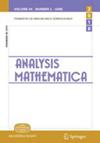A necessary condition for the boundedness of the maximal operator on \(L^{p(\cdot)}\) over reverse doubling spaces of homogeneous type
IF 0.5
3区 数学
Q3 MATHEMATICS
引用次数: 0
Abstract
Let \((X,d,\mu)\) be a space of homogeneous type and \(p(\cdot) \colon X \to[1,\infty]\) be a variable exponent. We show that if the measure \(\mu\) is Borel-semiregular and reverse doubling, then the condition \({ess\,inf}_{x\in X}p(x)>1\) is necessary for the boundedness of the Hardy–Littlewood maximal operator \(M\) on the variable Lebesgue space \(L^{p(\cdot)}(X,d,\mu)\).
齐次型反向加倍空间\(L^{p(\cdot)}\)上极大算子有界性的必要条件
设\((X,d,\mu)\)为齐次型空间,\(p(\cdot) \colon X \to[1,\infty]\)为变量指数。我们证明了如果测度\(\mu\)是borel -半正则和反向加倍,那么条件\({ess\,inf}_{x\in X}p(x)>1\)是变量Lebesgue空间\(L^{p(\cdot)}(X,d,\mu)\)上Hardy-Littlewood极大算子\(M\)的有界性的必要条件。
本文章由计算机程序翻译,如有差异,请以英文原文为准。
求助全文
约1分钟内获得全文
求助全文
来源期刊

Analysis Mathematica
MATHEMATICS-
CiteScore
1.00
自引率
14.30%
发文量
54
审稿时长
>12 weeks
期刊介绍:
Traditionally the emphasis of Analysis Mathematica is classical analysis, including real functions (MSC 2010: 26xx), measure and integration (28xx), functions of a complex variable (30xx), special functions (33xx), sequences, series, summability (40xx), approximations and expansions (41xx).
The scope also includes potential theory (31xx), several complex variables and analytic spaces (32xx), harmonic analysis on Euclidean spaces (42xx), abstract harmonic analysis (43xx).
The journal willingly considers papers in difference and functional equations (39xx), functional analysis (46xx), operator theory (47xx), analysis on topological groups and metric spaces, matrix analysis, discrete versions of topics in analysis, convex and geometric analysis and the interplay between geometry and analysis.
 求助内容:
求助内容: 应助结果提醒方式:
应助结果提醒方式:


